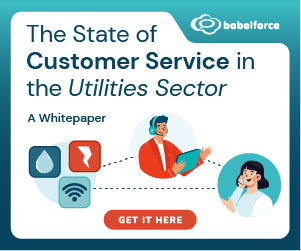Is your customer experience being compromised by skills gaps in your frontline teams? Then perhaps you need a more consistent approach to building agent competence in your contact centre.
That’s why our Editor, Megan Jones, interviewed Brittany Hodak, Keynote Speaker & Author of Creating Superfans, and Adam Boelke, Managing Partner at The Alignment Advantage Group, to find out how you can turn things around.
How to Build Up Agent Competence in Your Contact Centre
Here are 6 ways to develop more competent agents in your frontline teams:
1. Show What Your Service Should Feel Like (Don’t Just Tell)
Let’s be honest, if somebody is working in a contact centre – particularly representing a niche or high-end brand – they may have very little context about what it’s like to use that product or service, so it’s up to you as part of the onboarding process to let them feel what that experience is like.
A lot of times, people will say things like “we are a luxurious brand” or “we treat everyone with five-star white glove service” – but then you’re hiring people who have maybe never been on the receiving end of that.
Ultimately, you’re asking people to make it feel like first class, yet they may have never even been on an aeroplane before – let alone flown first class.
So, it’s really important to show not just tell what you mean by the level of service expectations, as Brittany Hodak explains:

“This could be as simple as sending them out to a nice restaurant to have a nice dinner, showing them some clips of what the service looks like, or giving them real-life examples to highlight that, when their instinct might be to do action A, you actually want them to elevate it and take action B instead.
“You can’t just say to someone ‘provide amazing service’ or ‘create an incredible experience’ and expect them to be able to deliver it within a set of guardrails – without first defining those guardrails! Because that’s something that’s going to mean very different things to very different people.”
Don’t Leave Your Brand Voice to Chance
Absolutely everybody is going to come into a job with biases and habits – and a different view of what great customer service means. So, it’s essential that you convey what your brand’s voice is and what your standards are with concrete examples.
Otherwise, if you have 250 agents, you’re going to end up with 250 different interpretations of what the brand should be – rather than 250 people all speaking in this same voice with the same tone to convey the same thing for your brand!
2. Schedule Ongoing Role-Play Exercises
Scheduling regular structured role-play calls is a great tool that leaders can use to build and maintain agent competence.
This is because these exercises give agents the opportunity to work through any of their known weaknesses, or to practise responses to problems that they are anticipating (for example, questions about an upcoming roll-out or product launch) with real-time feedback from their supervisor.
As Brittany comments:
“Several agents have told me that ongoing role-playing exercises are the most helpful for them, as it gives them the ability to hone their skills in a low-stakes call.
“However, I believe you should always make sure agents know they’re taking part in a role-playing exercise instead of putting them in the hot seat thinking it’s a live call.
“Unfortunately, this approach is used by some leaders out there and it can really backfire, particularly if an agent suspects an unusual customer query is a secret role-playing exercise and doesn’t take it seriously.”
This approach can also upskill agents on how to handle more difficult and rarer queries that may come into the team, giving them the opportunity to practise their quick-thinking skills – above and beyond the repetitive, easier requests that they see all the time.
Mock calls are a great way for agents to practise scenarios they may come across. For more information, read our article: Use Mock Calls to Improve Agent Performance – With Free Exercises
3. Listen Back to Calls Side by Side
Another great way to build up an agent’s competence is to set aside regular time for them to listen to calls side by side with their manager.
This habit gives managers the opportunity to highlight what the agent is doing well and give some confidence-boosting encouragement, as well as share where there’s room for improvement.
As Brittany comments:
“This can be an empowering training exercise that not only makes your agents feel like the work that they’re doing is being seen and heard, but also that they are getting some genuine one-to-one time with their manager to help them upskill.
“It’s equally important that this exercise is a value-add and not part of the standard QA process too, as you don’t want agents to fear being reprimanded. Instead, the emphasis should be clearly rooted in personal and professional skill development.”
4. Create an Emerging Leaders Programme

A great way to improve agent competence in the contact centre is to create an Emerging Leaders Programme, as Adam Boelke explains:
“When you proactively offer opportunities for personal development, it sends a strong message to your teams that they can grow within the company. This really helps them to engage in the process of improving their own performance.”
Ask Your Agents “What Direction Do You Want Your Career to Take?”
A good way to kick-start this initiative is by asking your highest-performing agents: “what direction do you want your career to take?”
Then you can offer to foot the bill for suitable training courses to help their career take shape, so long as they complete the training in their own time and show some initiative.
For example, if they say they want to be a supervisor, they could take a course on how to manage people effectively or how to have confrontational conversations without damaging the relationship.
Note, an easy way to manage this is to sign up to an online training course programme on subscription, making it easy and accessible for your agents to pick and choose from different courses.
For some suggestions on how to develop your employees’ future career prospects within the contact centre, read our article: 10 Career Progression Opportunities to Offer Your Team
Only Offer This Opportunity to Your Highest Performers
To really help build agent competence in the long term, this should only be available to your highest performers, as it sends the message that strong performance opens doors for progression, helping to raise the standards of performance across the board whilst also preparing for necessary succession planning.
Top Tip
When deciding who your highest performers are, make sure you cross-reference this viewpoint between managers, as Adam adds:
“It always helps to get a second opinion to truly gauge whether someone is a high performer or not. This is because their direct manager may think they are brilliant, but other managers across the contact centre may have a different experience – better or worse.
“When you take the extra time to corroborate the impression of their work ethic, it can help weed out anyone who isn’t a consistently high performer.”
5. Limit Burnout! No One Gives Their Best When They Are Stressed Out and Exhausted
Whatever training and onboarding initiatives you have in place, it’s equally important to be mindful that no one can be at the top of their game 24/7.
After all, even your most experienced agents can’t give you their best if they are always stressed out and overwhelmed – jumping from call to call without a chance to decompress.
That’s why building and maintaining a competent team of agents also comes down to making sure they take the breaks they need to recharge.
It can seem counterproductive in the short term, but just always think to yourself, would you rather someone in your team consistently take 26 amazing calls in their shift or burn out doing 30 rubbish ones?
6. Create a Hiring Profile With the Skills Your Agents Really Need
Finally, don’t overlook the role of the hiring process!
Building a more competent team starts before agents even join your team, so invest time in creating a clear profile of the type of person and skills that you need.
For example, you might specifically need:
- Someone who has a lot of product knowledge,
- Or someone who can translate one language to another,
- Or someone who has a lot of empathy because they’re going to be dealing with emotional customers,
- Or someone who is comfortable using new and emerging technologies, as you’ve recently invested in some AI solutions.
Whatever skills you need, by communicating this to your hiring manager to say, “this is what the right kind of candidate looks like”, you set your standards high from day one and have a much better chance of attracting the right people into your team.
As Brittany comments:
“Your agents are your Acting Chief of Experience for your brand, so set aside some time to define what the perfect candidate looks like to you. Otherwise, you risk bringing the wrong person into the team and setting everyone up to fail – no matter how hard you try.”
Every Agent Should Be Able to Represent Your Brand Well
At the end of the day, agent competence is all about knowing that, regardless of who the customer speaks to, you are confident that the agent can truly represent your brand, as Brittany concludes:
“It’s important to remember that the agent IS your brand to the customer who is calling in for support. They have no idea if this is somebody who has been with your team for two weeks or 20 years, and, ultimately, they don’t care!
“To them, this is the person who has been charged to help solve their problem, so it is critically important that, as part of your training and onboarding, you help every agent understand the important role that they play in your brand, and that they have the skills they need to deliver great service.”
If you want to read more articles about developing and supporting your call centre teams, read these next:
- Kick-Start Your Next Team Engagement Day – With These Tried and Tested Activities
- 5 Soft Skills Every Agent Needs Before Taking Their First Call
- How to Utilize Tone of Voice in the Contact Centre
Author: Megan Jones
Reviewed by: Xander Freeman
Published On: 31st Jul 2024 - Last modified: 18th Sep 2025
Read more about - Call Centre Management, Adam Boelke, Agent Performance, Brittany Hodak, Customer Experience (CX), Leadership, Management Strategies, Recruitment and HR, Team Management, Top Story, Training and Coaching











































